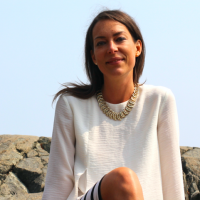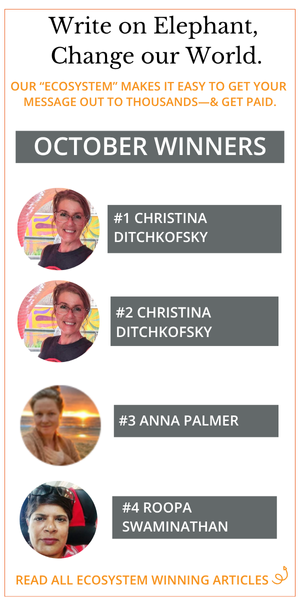![]()
Someone called me selfish today, and it took me aback.
My initial reaction was to feel hurt—and I also felt guilt and shame that I was possibly not giving enough. I felt terrible that maybe I had hindered someone’s heart with my actions. Then, I got angry and thought about it more.
We are born selfish. We’re born not just asking for what we want, but demanding it—because that is the only way we’ll thrive and survive. Then, we learn to share (not always a bad thing!). We’re taught to say yes, instead of our feeling inside of no—and especially as women, we’re trained to give our bodies freely, to lend our hands before they were asked for, and to always accommodate another so that they’re comfortable.
As I grew up, I was shown that my own needs and desires should not come first; if I ever put myself first, I was called hurtful names. I was shamed if I stood up for myself, especially in the face of men.
We are often schooled to be caretakers, but not of ourselves—of everyone else. And what happens then is that we tend to lose ourselves and the right to protect our own bodies.
When we become caretakers of other people’s needs we take away their own accountability. We do not allow them to be the adults that they are meant to be; in an energetic manner, we disempower them, as we are projecting that they cannot handle their own lives.
There is a notion from Harry Brown’s book, How I Found Freedom in an Unfree World, that I very much enjoy. The idea is: “That if someone accuses you of being selfish, the reality is that they are only upset because you aren’t doing what they selfishly want you to do.”
I have read a bit about selfishness now, and what most people say is that self-care and selfishness are not the same thing; but because I love to challenge the meaning of words, I say, “Why don’t we just become more friendly to the idea that humans can use selfishness in a positive way?”
In my lineage of Buddhism, we practice that all pure action comes form a place of innate goodness. As I have discovered in my own life, when I stray from my inner truth and strength—to be, instead, what someone else feels they need—it never works out well. This is how resentment builds, as well as codependency and patterns of subtle or overt abuse. This does not mean, however, that I am not a caring person. I will support others in a passionate way, but I will not do so if it threatens my own feelings of safety and well-being.
Today, when I was called selfish, it was not such a wrong or horrible name to be labeled as after all. Perhaps, it might be a mirror for all the work I have done to be healthy and whole. My body now is sacred and a temple to call my own. My life is of value, and I take care of my needs and wants, before I take care of others’ needs.
However, I do not think this makes me a bad person. This might actually be what allows me to do more good. Healing sometimes looks like remembering how we were before all the layers of doctrine and “shoulds” were piled on.
So, thank you to the person who called me selfish today. They triggered something quite old in me—the belief that I should value how others feel above my own needs and desires.
But, nope—I don’t do that anymore. And, after unpacking this conversation, I understand how bending to another’s wishes does not serve them either. Healthy humans understand boundaries. Boundaries can be the solid container around the sandbox that we wish to play inside.
I’ve heard a lot of highly astute people say that 2018 is a year to live for ourselves—so also, thank you, flinger of insults, for reminding me that my growth is right on track and in line.
We must remember how to show up for our own self. This is what many of us have been yearning for and missing as we have grown into adult individuals. We have disregarded our “me time” and also that subtle inner guide that wishes to support us on our path to our most meaningful lives.
Much of the work I do with others is to remind them that they do know what their boundaries are, and that they do have certain wants and needs that are specific to themselves. Also, that we each have a very specific light to shine, and we can’t do so if we are trying to shine another’s for them.
Many of us are keen to be told that “it is okay to say no.” Yes, we are allowed to say no, even without an explanation.
We have been trained to be silent about what our honest position is in order to please others. It’s time to take our power back—and 2018 just might be the year that we do so. “Selfishness,” it seems, may be a true offshoot of love.
~
Relephant:
Why we aren’t nearly Selfish Enough.
Why Putting Ourselves First is the Opposite of Selfish.
~
Author: Sarah Norrad
Image: Author’s own
Editor: Yoli Ramazzina
Copy editor: Callie Rushton


 Share on bsky
Share on bsky




Read 0 comments and reply